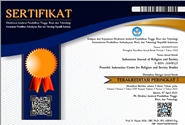What Drives Political Engagement of the Young Generation? A Political Psychology Study
Abstract
Keywords
Full Text:
PDFReferences
Alelaimat, M. S. (2019). Factors affecting political participation (Jordanian universities students’ voting: field study 2017-2018). Review of Economics and Political Science, ahead-of-p(ahead-of-print). https://doi.org/10.1108/reps-05-2019-0072
Alexander, A. G. (2022). Voting Behavior and Motivations across Generations: Evidence from a Nationally Representative U.S. Survey (University of Mississipi). University of Mississipi. Retrieved from https://egrove.olemiss.edu/hon_thesis/2684/
Alfaruqy, M. Z. (2022). Generasi Z Dan Nilai-Nilai Yang Dipersepsikan Dari Orangtuanya Generation Z And The Perceived Values From The Parents (Vol. 4).
Alfaruqy, M. Z., & Kunci, K. (2022). Nationalism From The Founding Father’s Perspective (A Psycho-Hermeneutic Analysis). Jurnal Penelitian Humaniora, 23(1), 1–1.
Alfaruqy, M. Z., & Masykur, A. M. (2014). Memaknai Nasionalisme: Studi Kualitatif Fenomenologis pada Presiden Mahasiswa Perguruan Tinggi Negeri di Jawa Tengah dan Daerah Istimewa Yogyakarta. Jurnal EMPATI, 3(2), 246–256.
Allen, L. R., & Bang, H. J. (2015). Ecological contexts and youth civic and political engagement in Paris, France. Journal of Applied Developmental Psychology, 39, 34–43. https://doi.org/10.1016/j.appdev.2015.04.010
Ashley, S., Maksl, A., & Craft, S. (2017). News Media Literacy and Political Engagement: What’s the Connection? Journal of Media Literacy Education, 9(1), 79–98.
Ballard, P. J., Ni, X., & Brocato, N. (2020). Political engagement and wellbeing among college students. Journal of Applied Developmental Psychology, 71. https://doi.org/10.1016/j.appdev.2020.101209
Baron, R. A., & Branscombe, N. R. (n.d.). Social psychology.
Beesley, C., & Hawkins, D. (2022). Corruption, institutional trust and political engagement in Peru. World Development, 151. https://doi.org/10.1016/j.worlddev.2021.105743
Besco, R., Garcia-Rios, S., Lagodny, J., Lajevardi, N., Oskooii, K., & Tolley, E. (2022). Fight not flight: The effects of explicit racism on minority political engagement. Electoral Studies, 80. https://doi.org/10.1016/j.electstud.2022.102515
Binder, A., Heiss, R., Matthes, J., & Sander, D. (2021). Dealigned but mobilized? Insights from a citizen science study on youth political engagement. Journal of Youth Studies, 24(2), 232–249. https://doi.org/10.1080/13676261.2020.1714567
Bode, L. (2016). Political News in the News Feed: Learning Politics from Social Media. Mass Communication and Society, 19(1), 24–48. https://doi.org/10.1080/15205436.2015.1045149
Bode, L. (2017). Closing the gap: gender parity in political engagement on social media. Information Communication and Society, 20(4), 587–603. https://doi.org/10.1080/1369118X.2016.1202302
Borbáth, E., Hunger, S., Hutter, S., & Oana, I. E. (2021). Civic and Political Engagement during the Multifaceted COVID-19 Crisis. Swiss Political Science Review, 27(2), 311–324. https://doi.org/10.1111/spsr.12446
Boulianne, S., & Theocharis, Y. (2020). Young People, Digital Media, and Engagement: A Meta-Analysis of Research. Social Science Computer Review, 38(2), 111–127. https://doi.org/10.1177/0894439318814190
Carlisle, J. E., & Patton, R. C. (2013). Is Social Media Changing How We Understand Political Engagement? An Analysis of Facebook and the 2008 Presidential Election. Political Research Quarterly, 66(4), 883–895. https://doi.org/10.1177/1065912913482758
Eckstein, K., Noack, P., & Gniewosz, B. (2012). Attitudes toward political engagement and willingness to participate in politics: Trajectories throughout adolescence. Journal of Adolescence, 35(3), 485–495. https://doi.org/10.1016/j.adolescence.2011.07.002
Francis, T., & Hoefel, F. (2018). “True Gen”: Generation Z and its implications for companies. McKinsey & Company. Retrieved from https://www.mckinsey.com/~/media/McKinsey/Industries/Consumer Packaged Goods/Our Insights/True Gen Generation Z and its implications for companies/Generation-Z-and-its-implication-for-companies.pdf
Halmburger, A., Baumert, A., & Rothmund, T. (2019). Seen one, seen ‘Em all? Do reports about law violations of a single politician impair the perceived trustworthiness of politicians in general and of the political system? Journal of Social and Political Psychology, 7(1), 448–477. https://doi.org/10.5964/jspp.v7i1.933
Henn, M., & Foard, N. (2014). Social differentiation in young people’s political participation: The impact of social and educational factors on youth political engagement in Britain. Journal of Youth Studies, 17(3), 360–380. https://doi.org/10.1080/13676261.2013.830704
Janmaat, J. G., & Hoskins, B. (2022). The Changing Impact of Family Background on Political Engagement During Adolescence and Early Adulthood. Social Forces, 101(1), 227–251. https://doi.org/10.1093/sf/soab112
Kahne, J., Crow, D., & Lee, N.-J. (2013). Different Pedagogy, Different Politics: High School Learning Opportunities and Youth Political Engagement. Political Psychology, 34(3), 419–441. https://doi.org/10.1111/j
Keating, A., & Melis, G. (2017). Social media and youth political engagement: Preaching to the converted or providing a new voice for youth? British Journal of Politics and International Relations, 19(4), 877–894. https://doi.org/10.1177/1369148117718461
Kleinnijenhuis, J., Van Hoof, A. M. J., & Van Atteveldt, W. (2019). The combined effects of mass media and social media on political perceptions and preferences. Journal of Communication, 69(6), 650–673. https://doi.org/10.1093/joc/jqz038
Levy, B. L. M., & Akiva, T. (2019). Motivating Political Participation Among Youth: An Analysis of Factors Related to Adolescents’ Political Engagement. Political Psychology, 40(5), 1039–1055. https://doi.org/10.1111/pops.12578
Matthes, J. (2022). Social Media and the Political Engagement of Young Adults: Between Mobilization and Distraction. Online Media and Global Communication, 1(1), 6–22. https://doi.org/10.1515/omgc-2022-0006
Mumtaza, S. N., Sajidah, S. A., Abidah, T. U., & Alfaruqy, M. Z. (n.d.). Helping for Fraud Action: Studi Relasi Kooperatif Mahasiswa dalam Aksi Kecurangan. https://doi.org/10.31294/jc.v19i2
Owen, D., & Soule, S. (n.d.). Political Knowledge and Dimensions of Political Engagement.
Pande, R. (n.d.). Can democracy work for the poor?
Pontes, A. I., Henn, M., & Griffiths, M. D. (2019). Youth political (dis)engagement and the need for citizenship education: Encouraging young people’s civic and political participation through the curriculum. Education, Citizenship and Social Justice, 14(1), 3–21. https://doi.org/10.1177/1746197917734542
Xenos, M., Vromen, A., & Loader, B. D. (2014). The great equalizer? Patterns of social media use and youth political engagement in three advanced democracies. Information Communication and Society, 17(2), 151–167. https://doi.org/10.1080/1369118X.2013.871318
DOI: https://doi.org/10.36256/ijrs.v5i1.335
Refbacks
- There are currently no refbacks.
Copyright (c) 2023 Indonesian Journal of Religion and Society

This work is licensed under a Creative Commons Attribution-NonCommercial 4.0 International License.
Indonesian Journal of Religion and Society (IJRS) Is Indexed By:

Indonesian Journal of Religion and Society (IJRS) is distribute under Creative Commons Attribution-NonCommercial 4.0 International License.













